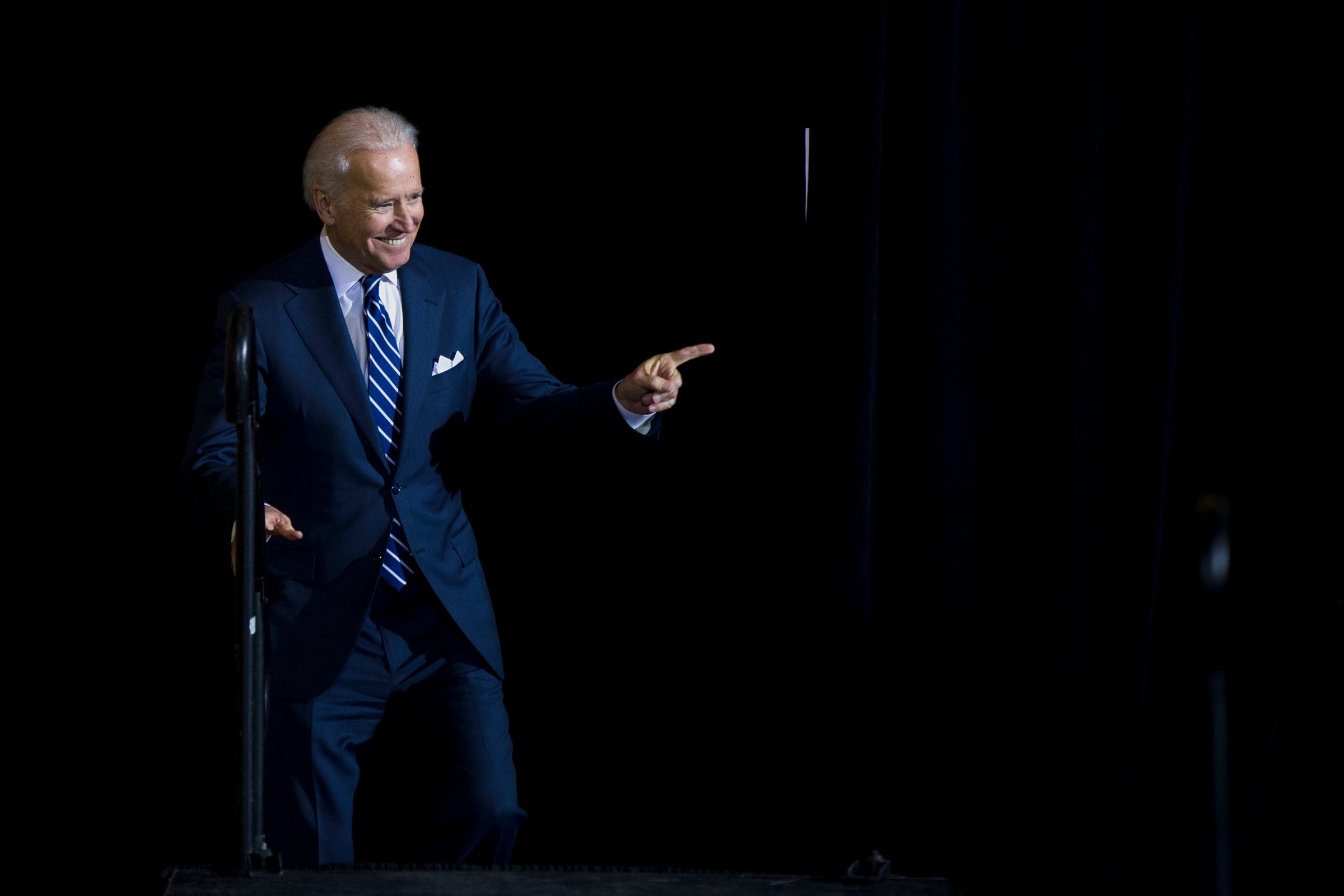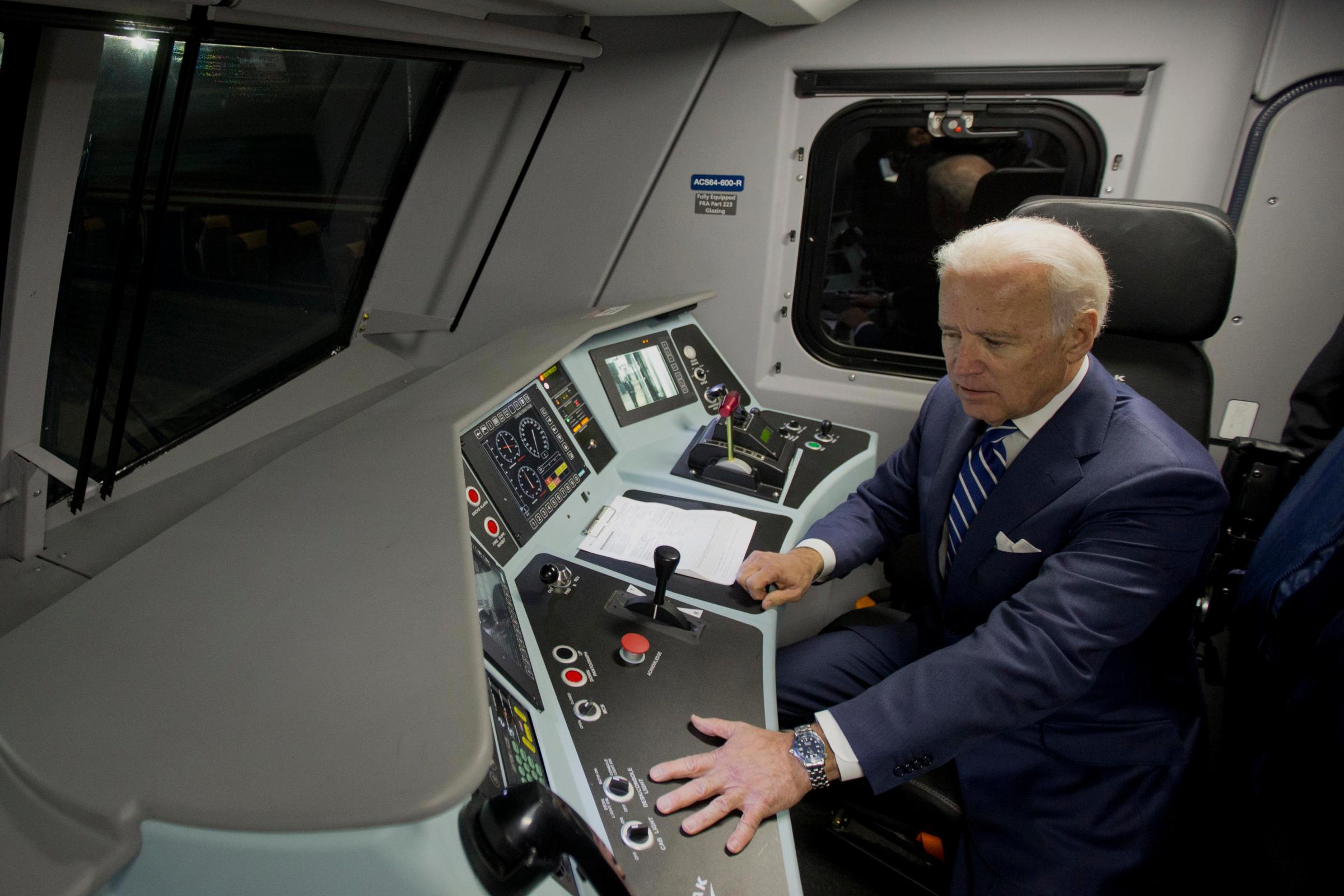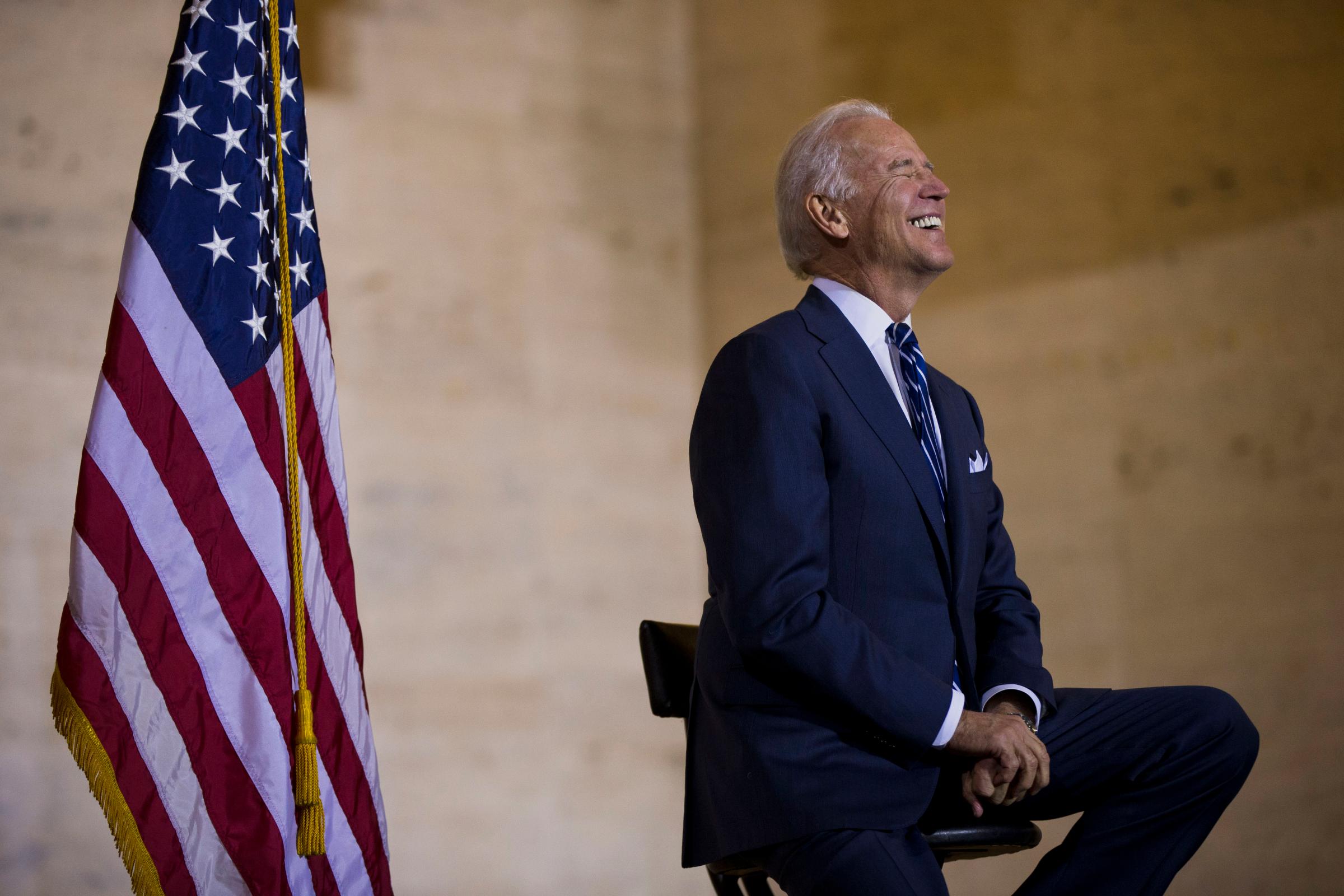
Sixteen months before he would begin his 2016 presidential campaign, if he even bothers, Vice President Joe Biden is in the middle of a press swing that looks a lot like a prelude to a run for the White House. There was a red-meat talk to a union crowd, a high-profile cable-news interview about why he sees no reason not to run in 2016, and then there’s the fact that he is getting back on the train again.
Sharply dressed in a sharp navy suit and pocket square, the affable Veep rode the Amtrak to Philadelphia Thursday, inviting a couple of reporters along for the ride. Sitting down with TIME on Thursday in his rolling office, a first-class car surrounded by aides and bodyguards, Biden interspersed nearly every answer with a reminder that he is more than “President of the Amtrak fan club,” as his traveling partner, Transportation Secretary Anthony Foxx, would introduce him at an afternoon event.
The ostensible reason for the trip was a new job he had just been handed, managing a new a career-training portfolio given to him by President Barack Obama. But there are other things to talk about too, and it just happens to be the sort of stuff you would hear from a guy who plans to run for President. He’s traveled more than 800,000 miles carrying out foreign policy, he boasts. “I’ve known and continue to know every one of these major world leaders by their first names and I have access to them,” he says. He reminds the reporter he oversaw the 2009 Recovery Act. “Less than 1% waste, fraud or abuse in the system,” he gushes in his speech later, quoting a Republican calling it “the best-run federal government program.” Then there’s Iraq, the Americas, “the Pacific Basin, China, Japan and Korea,” he says. “As well as what I’m doing now, like Ukraine. You know I’m the guy on the phone every day — well, not every day, but …”
(MORE: White House Defends Joe Biden From Gates Criticism)
He’s got plenty to say about domestic policy too. “I’ve been basically the guy who has the final say in the criminal-justice side of the budget,” he says. And he is perfectly happy to talk about how he compares with others in his job. He cites one of historian Robert Caro’s biographies on Lyndon Johnson to highlight his role in the Obama Administration. “There is no inherent power in the office of the vice presidency. Zero. None. It’s all a reflection of your relationship with the President,” he says. “I mean, Kennedy never let Johnson in the office. I spend somewhere between four and seven hours a day with the President.”
Of course, none of this means Biden is definitely running for President. It’s hard to see Biden mounting a campaign if Hillary Clinton runs. In a January Quinnipiac University survey, Biden polled as a distant second among Democratic primary voters with 8%, compared with Clinton’s 65%. And even if she doesn’t, he faces an uphill battle, fighting history (former VPs have fared poorly at the ballot box) and his underwater favorability numbers. “There may be reasons I don’t run, but there’s no obvious reason for me why I think I should not run,” Biden told CNN on Friday, adding he’d make up his mind next summer. Clinton, meanwhile, has pledged to make a decision by the end of the year.
But Biden is a political shark, an old-school pol who never stops swimming forward. He wants to leave his options open, and maybe more than anything be talked about running. If he decides to run, it would be his third attempt. He’s undoubtedly better known and better prepared, and has racked up a significant roster of accomplishments — even if he’s a little too eager to share them.
“You guys are the only guys keeping the barbarians at the gate,” he told the United Automobile Workers at their annual meeting in Washington last week. New York City Mayor Bill de Blasio was irked by Biden calling LaGuardia Airport something of the third world, but it was far from an offhand comment. Biden knows how to grab headlines. “It’s embarrassing and it’s stupid. It’s stupid. It puts us literally behind,” he says of the nation’s crumbling infrastructure.
For Biden, the challenge has always been how to square both sides of his persona: the man who wants to sell you a Corvette and the deeply influential policy hand. But that duality is also his strength. Clinton may not have driven a car in 20 years, but Biden can’t wait to get behind the wheel of the new Stingray. On the campaign trail in 2012, it was that combination that allowed him to connect in the blue collar areas unreceptive to Obama. “The middle class is shrinking. Income inequity has to be addressed,” he says in Philadelphia. But he adds, “The world knows America’s coming back stronger than ever before.”
(VIDEO: Vice President Joe Biden Gives Keynote Speech)
As Democrats flee Obama, Biden says he plans to help at least 150 Democrats in midterm elections this year. “I used to be talked about as the young, idealistic guy who was optimistic, and they now write about me as the White House optimist as if I’m the guy, as my grandpa from Scranton would say, who just fell off the turnip truck yesterday,” Biden tells the crowd in Philadelphia, repeating a theme that helped re-elect Obama and just might elect himself one more. “I’ve been there longer than all of them, but I guarantee you there’s a total justification for my incredible optimism about this country. It’s time. It’s time to move.”
As the train car made its way up the Acela corridor, a trip he estimates he has made 7,800 times, Biden spoke exclusively with TIME. Here is a lightly edited transcript of that exchange.

After the State of the Union, the President gave you the job-training portfolio. What’s your goal now for the second term? What would you like to do differently? What would you like to leave office having accomplished?
Well, look, No. 1, there’s really no change in responsibility. When I took office, when the President and I talked about my coming on as a vice-presidential candidate and his Vice President, I asked him why he wanted me on, and he said he wanted me to help him govern because I have a fair amount of experience and because if you go back and look at those 13 debates we had, the only two people who never disagreed on a policy matter were Barack and me. I mean, seriously. It’s not a joke. Although we’ve disagreed occasionally on tactics since he’s been President. So it makes it really easy. So he said, What portfolio do you want? And he talked about how [former Vice President Dick] Cheney had a portfolio and [former Vice President Al] Gore, and all the important Vice Presidents. And I said, I don’t want a portfolio. I said I wanted two things. One, I get to be the last guy in the room when every decision gets made. And literally, not figuratively. Literally. So after we do a national-security meeting, and I speak my mind there and the rest of everybody else does, I get to walk back up to the Oval with him and sit down. And [that’s] the reason why it always surprised me when everyone says they know what I advised the President. My final advice is always he and I alone. No. 2, I said I want assignments that have sell-by dates on them. Because the one thing you can do as Vice President — by the way, there is no inherent power in the office of the vice presidency. Zero. None. It’s all a reflection of your reflection of your relationship with the President. You’re probably a political junkie like me, and you read Caro’s book on Johnson when he was Vice President. I mean, Kennedy never let Johnson in the office. I spend somewhere between four and seven hours a day with the President. I attend every single meeting. I’m there.
(MORE: Biden: ‘I Could Make a Good President’)
The second point is, the value of the Vice President is you can cross jurisdictional lines. For example, this guy [Transportation Secretary Anthony Foxx] is first-rate, I’m not saying it because he’s there. And I’m not saying he was picked because I recommended him, because the President knew who he wanted. I mean this sincerely and we travel a lot together. But I am able to bring in transportation, labor, commerce and education, when we’re talking about this new job I have. None of these guys worry I want their authority. I’m not looking to — my brother-in-law has an expression: you never cut another guy’s grass. They know I want no wide authority in any of this, but I’m able to be the guy — I have a convening power. And the good news about it when the President gives me an authority, as Anthony already knows, he never second guesses, he just says do it. And I do it.
The second term is going to be more of the same. What you saw at the State of the Union was not fundamentally different than Biden’s gonna do Iraq, Biden’s gonna do the Recovery Act, Biden’s gonna do the — there are things that are urgent needs that he says go do it. So I don’t see any fundamental change. And on foreign policy, I’ve traveled 800,000 miles as Vice President. And because I’ve known and continue to know every one of these major world leaders by their first names, and I have access to them because they know when I speak, I speak directly for him. They don’t wonder if I spend five and a half hours with [Chinese President] Xi [Jinping] as Vice President — it’s like why the Vice President? It’s not me, they know that there’s no filter. I speak for the President. I’m sure I’m going to continue to be doing a lot of foreign travel, particularly as it relates to this hemisphere, the Pacific Basin, China, Japan and Korea. As well as what I’m doing now, like Ukraine. You know I’m the guy on the phone every day — well, not every day, but … that’s kind of been the pattern. It’ll be different assignments, different things. I guess the best way to say it is the way the President tags it is, he’s got a full plate, what are those things that demand his attention that he doesn’t have time to do full time that he slides them over onto my plate. They are the kinds of things I expect the next three years will be about.
One of the things the President has worked on now, is criminal-justice reforms, in particular regarding drug policy. This is something that you have a long record on, from inventing the drug czar. The President talked to David Remnick about legalization of marijuana. Is that something that you’ve come around on, and do you support some of the efforts there?
No. Look, I support the President’s policy. I think the idea of focusing significant resources on interdicting or convicting people for smoking marijuana is a waste of our resources. Our policy for our Administration is still not legalization, and that is and continues to be our policy.
But on the entire criminal-justice front, the good news is there are two things the President asked in the beginning that I wanted to have sort of day-to-day jurisdiction over. And one was I said the violence-against-women portfolio and law enforcement, cops. The great news is that I have an incredible relationship with the Attorney General. Other Attorney Generals might go “Whoa, whoa, wait, Biden shouldn’t be picking who’s gonna be in each of these offices,” but I’m able to do that. When we put together the budget, I’ve been basically the guy who has the final say in the criminal-justice side of the budget. So and I’m still a point person along with the Attorney General with law enforcement, with the criminal-justice system and all those issues relating to violence against women. One of the things the President and I agree on, and I think most of the Cabinet secretaries agree on: when something in their shop gets pulled into the White House, it has a little more horsepower. And those things that get pulled are usually things [that] get handed to me. I’m going to say something self-serving — because I get along — I’ve never had a Cabinet secretary who’s gone “Whoa, whoa” — notwithstanding [former Defense Secretary Robert] Gates’ book — or has there ever been any kind of “What the hell’s he doing,” because I’ve never, as I said, cut their grass.
(MORE: Vice President Joe Biden Not High on Marijuana Legalization)
So on the criminal-justice side, I am not only the guy who did the crime bill and the drug czar, but I’m also the guy who spent years when I was chairman of the Judiciary Committee and chairman of [the Senate Foreign Relations Committee], trying to change drug policy relative to cocaine, for example, crack and powder. I mean, I worked for the last five years I was there, and [Illinois Senator Richard] Durbin’s continuing to work. And [New York Senator Chuck] Schumer. And the President shares this. And I’m still engaged in those things. I don’t know if this explains it very well, but what happens is, with the exception of violence against women, which is sort of totally my deal, sometimes the plate gets filled up. For example, during the air-identification-zone mini-crisis with China, well, I was asked to go try to work that. And [Japanese Prime Minister Shinzo] Abe and [South Korean President] Park [Geun-hye], and I was asked to work that. In the meantime there were some things that came, everything from marijuana to drug control. And I was on another assignment. When I’m in there, when we’re both in town, I attend every meeting [Obama] has.

The Congressional Budget Office report the other day gave Republicans a lot of fodder.
But when you look at the report, it gives no fodder. It says, No. 1, there’s not any corporations or businesses that are laying people off because of this. No. 2, it talks about how the act has worked pretty damn well in terms of — the ACA has worked well. And what they’re talking about, which is the headline, if you look at [Congressional Budget Office director Douglas] Elmendorf’s testimony, he said no, it doesn’t cost any jobs. What we’re talking about is it a good thing. It’s a bad thing I think — to paraphrase him, it’s a bad thing when somebody gets laid off and they have no job. It’s a bad thing when someone wants to stay in a job and it’s closed down or frozen. He said it’s not a bad thing when an employee goes in and says, “I’m going to retire because I have the ACA. I as the husband or wife, I don’t need this job, which used to be the only vehicle for my health care. Now I’m going to go home and take care of the kids, or I’m going to go back to college, or I’m going to do whatever.” But what that does in a macroeconomic sense, as you know, that means is someone’s not in the labor market. That cost a job. That reduces the growth in the GDP. Well, you’ve got a whole baby-boomer generation that were hanging on to jobs, not moving because either they were tied down because their mortgage was underwater or they couldn’t leave because they had health care. This frees people up. And there is zero evidence that this is costing people jobs now.
Two quick Senate questions: Do you intend to campaign against Senator Mitch McConnell, and is Mike Bloomberg wrong to be running ads against Democrats who voted against Democrats who voted against background checks like Mark Pryor?
Look, I have a really close relationship with Mike Bloomberg. And I have campaigned a lot. I’m probably going into 150 more races. But I have never campaigned against a sitting Republican. What I do is, I campaign for the Democrat. So, will I go into Kentucky? Jerry Lundergan, who is the dad of our candidate, is a close friend of mine. He was the Biden chairman for my effort to win Kentucky, which we never got to in ’08, so I’m sure I will help his daughter if they ask to raise money. I think it’s a bad idea, and it’s happened too much but I’ve never done it, for sitting Senators of either party, and leaders of either party, to campaign personally against the other leader. But I will be campaigning for a lot of Democratic races where there is an incumbent Republican.
More Must-Reads from TIME
- Donald Trump Is TIME's 2024 Person of the Year
- Why We Chose Trump as Person of the Year
- Is Intermittent Fasting Good or Bad for You?
- The 100 Must-Read Books of 2024
- The 20 Best Christmas TV Episodes
- Column: If Optimism Feels Ridiculous Now, Try Hope
- The Future of Climate Action Is Trade Policy
- Merle Bombardieri Is Helping People Make the Baby Decision
Contact us at letters@time.com